Law of Contract and Tort in Australia: Amadio Case Analysis
VerifiedAdded on 2020/05/28
|7
|1162
|41
Homework Assignment
AI Summary
This assignment provides an in-depth analysis of the Law of Contract and Tort in Australia, focusing on the significant Amadio case. The assignment begins with an introduction and then addresses ten specific questions related to the case, examining the legal principles of misrepresentation, unconscionable conduct, and undue influence. It explores the arguments made by Mr. and Mrs. Amadio, the court's rulings, and the circumstances that led to the bank's liability. The discussion covers Justice Gibbs's perspective on the bank's disclosure obligations, the concept of misrepresentation, and Justice Mason's views on inequality of bargaining power. The assignment also differentiates between undue influence and unconscionable dealings and explores the conditions under which a bank can be held liable to a guarantor. Finally, the assignment concludes with a list of references used in the analysis.
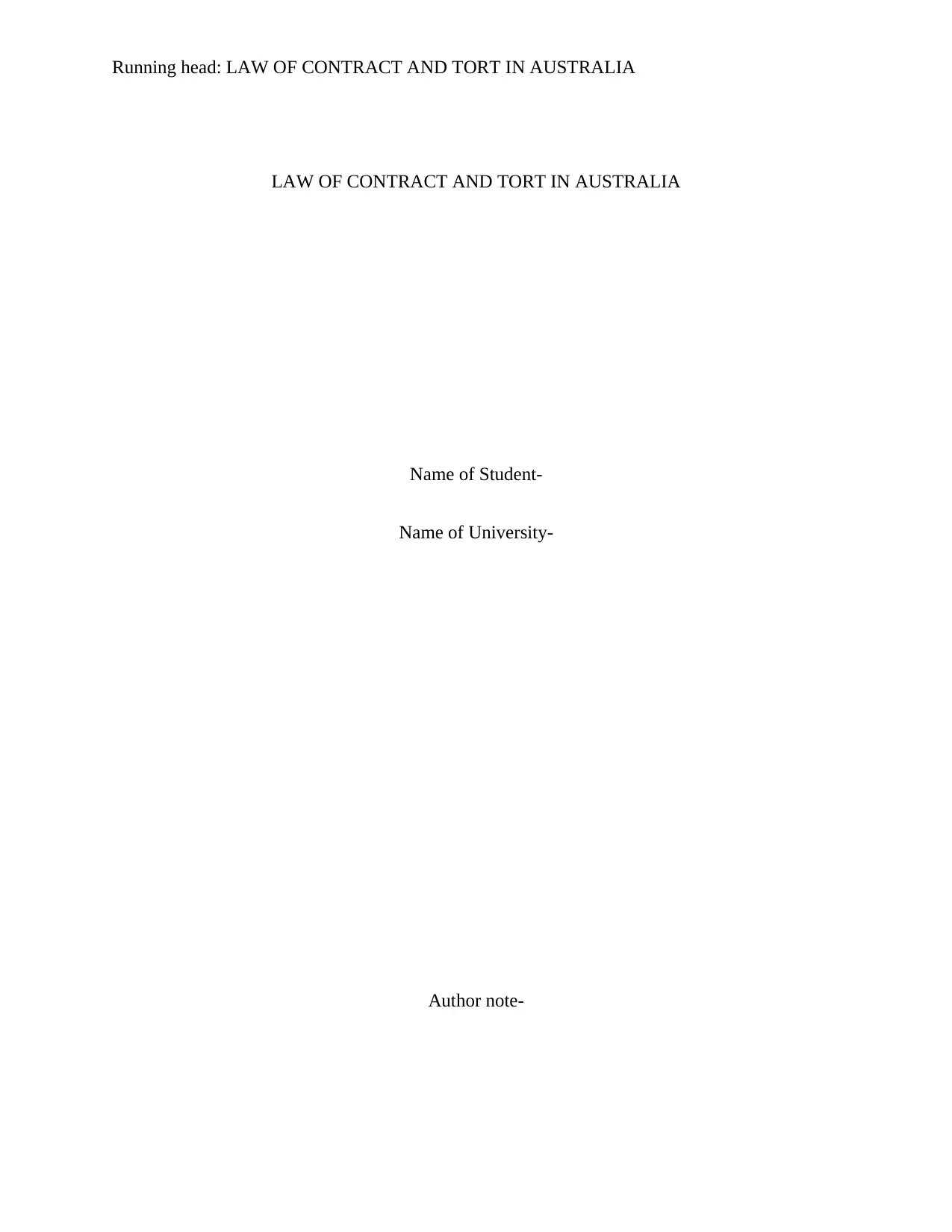
Running head: LAW OF CONTRACT AND TORT IN AUSTRALIA
LAW OF CONTRACT AND TORT IN AUSTRALIA
Name of Student-
Name of University-
Author note-
LAW OF CONTRACT AND TORT IN AUSTRALIA
Name of Student-
Name of University-
Author note-
Paraphrase This Document
Need a fresh take? Get an instant paraphrase of this document with our AI Paraphraser
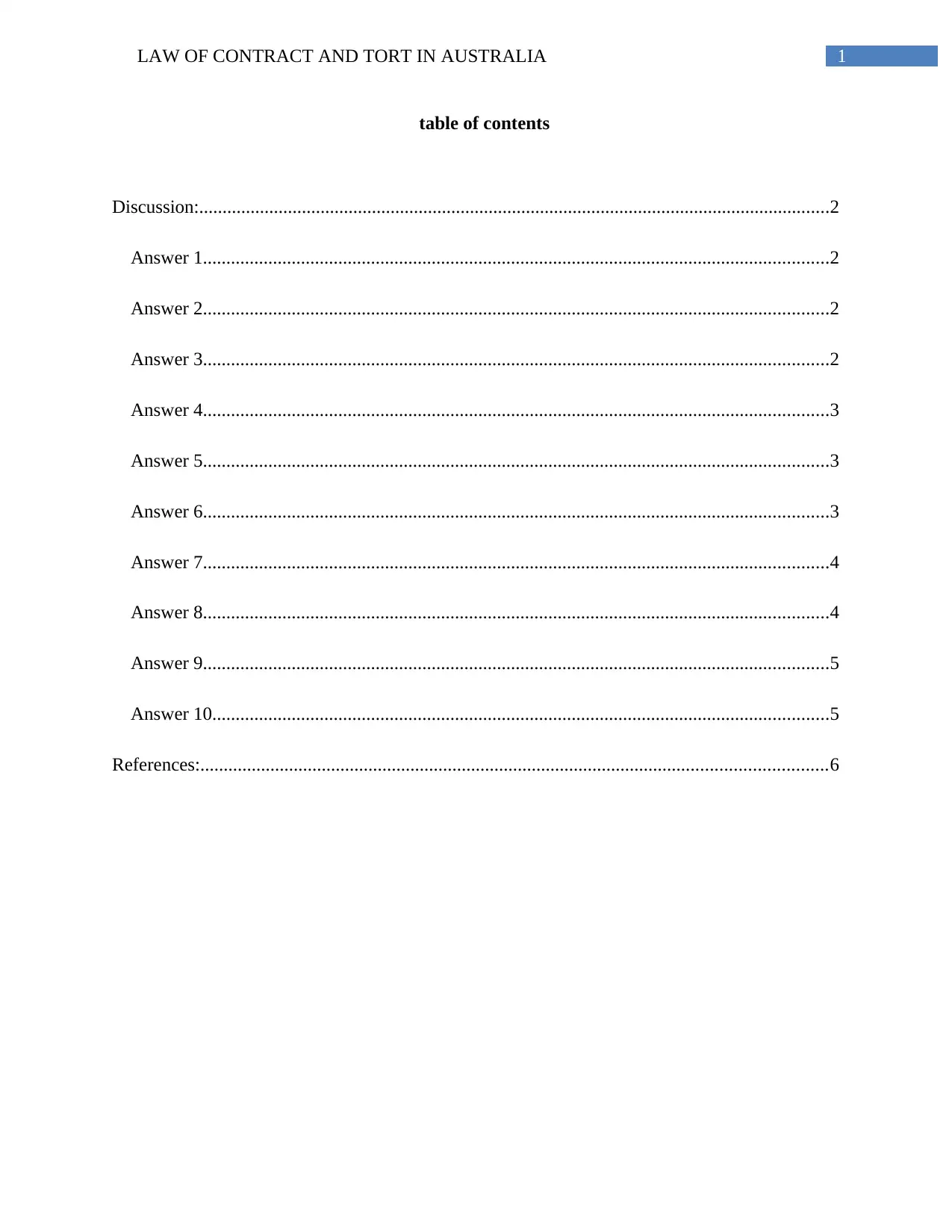
1LAW OF CONTRACT AND TORT IN AUSTRALIA
table of contents
Discussion:.......................................................................................................................................2
Answer 1......................................................................................................................................2
Answer 2......................................................................................................................................2
Answer 3......................................................................................................................................2
Answer 4......................................................................................................................................3
Answer 5......................................................................................................................................3
Answer 6......................................................................................................................................3
Answer 7......................................................................................................................................4
Answer 8......................................................................................................................................4
Answer 9......................................................................................................................................5
Answer 10....................................................................................................................................5
References:......................................................................................................................................6
table of contents
Discussion:.......................................................................................................................................2
Answer 1......................................................................................................................................2
Answer 2......................................................................................................................................2
Answer 3......................................................................................................................................2
Answer 4......................................................................................................................................3
Answer 5......................................................................................................................................3
Answer 6......................................................................................................................................3
Answer 7......................................................................................................................................4
Answer 8......................................................................................................................................4
Answer 9......................................................................................................................................5
Answer 10....................................................................................................................................5
References:......................................................................................................................................6
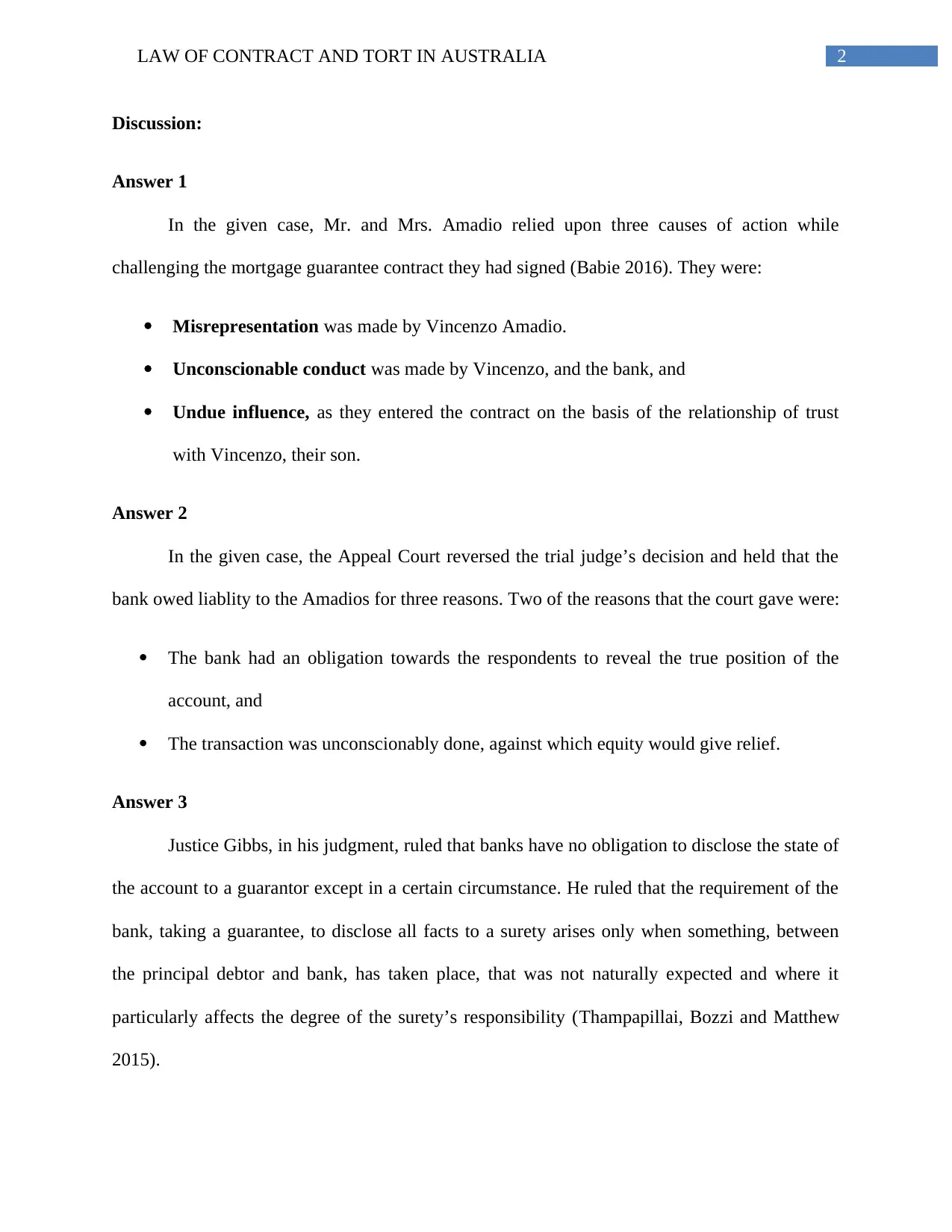
2LAW OF CONTRACT AND TORT IN AUSTRALIA
Discussion:
Answer 1
In the given case, Mr. and Mrs. Amadio relied upon three causes of action while
challenging the mortgage guarantee contract they had signed (Babie 2016). They were:
Misrepresentation was made by Vincenzo Amadio.
Unconscionable conduct was made by Vincenzo, and the bank, and
Undue influence, as they entered the contract on the basis of the relationship of trust
with Vincenzo, their son.
Answer 2
In the given case, the Appeal Court reversed the trial judge’s decision and held that the
bank owed liablity to the Amadios for three reasons. Two of the reasons that the court gave were:
The bank had an obligation towards the respondents to reveal the true position of the
account, and
The transaction was unconscionably done, against which equity would give relief.
Answer 3
Justice Gibbs, in his judgment, ruled that banks have no obligation to disclose the state of
the account to a guarantor except in a certain circumstance. He ruled that the requirement of the
bank, taking a guarantee, to disclose all facts to a surety arises only when something, between
the principal debtor and bank, has taken place, that was not naturally expected and where it
particularly affects the degree of the surety’s responsibility (Thampapillai, Bozzi and Matthew
2015).
Discussion:
Answer 1
In the given case, Mr. and Mrs. Amadio relied upon three causes of action while
challenging the mortgage guarantee contract they had signed (Babie 2016). They were:
Misrepresentation was made by Vincenzo Amadio.
Unconscionable conduct was made by Vincenzo, and the bank, and
Undue influence, as they entered the contract on the basis of the relationship of trust
with Vincenzo, their son.
Answer 2
In the given case, the Appeal Court reversed the trial judge’s decision and held that the
bank owed liablity to the Amadios for three reasons. Two of the reasons that the court gave were:
The bank had an obligation towards the respondents to reveal the true position of the
account, and
The transaction was unconscionably done, against which equity would give relief.
Answer 3
Justice Gibbs, in his judgment, ruled that banks have no obligation to disclose the state of
the account to a guarantor except in a certain circumstance. He ruled that the requirement of the
bank, taking a guarantee, to disclose all facts to a surety arises only when something, between
the principal debtor and bank, has taken place, that was not naturally expected and where it
particularly affects the degree of the surety’s responsibility (Thampapillai, Bozzi and Matthew
2015).
⊘ This is a preview!⊘
Do you want full access?
Subscribe today to unlock all pages.

Trusted by 1+ million students worldwide
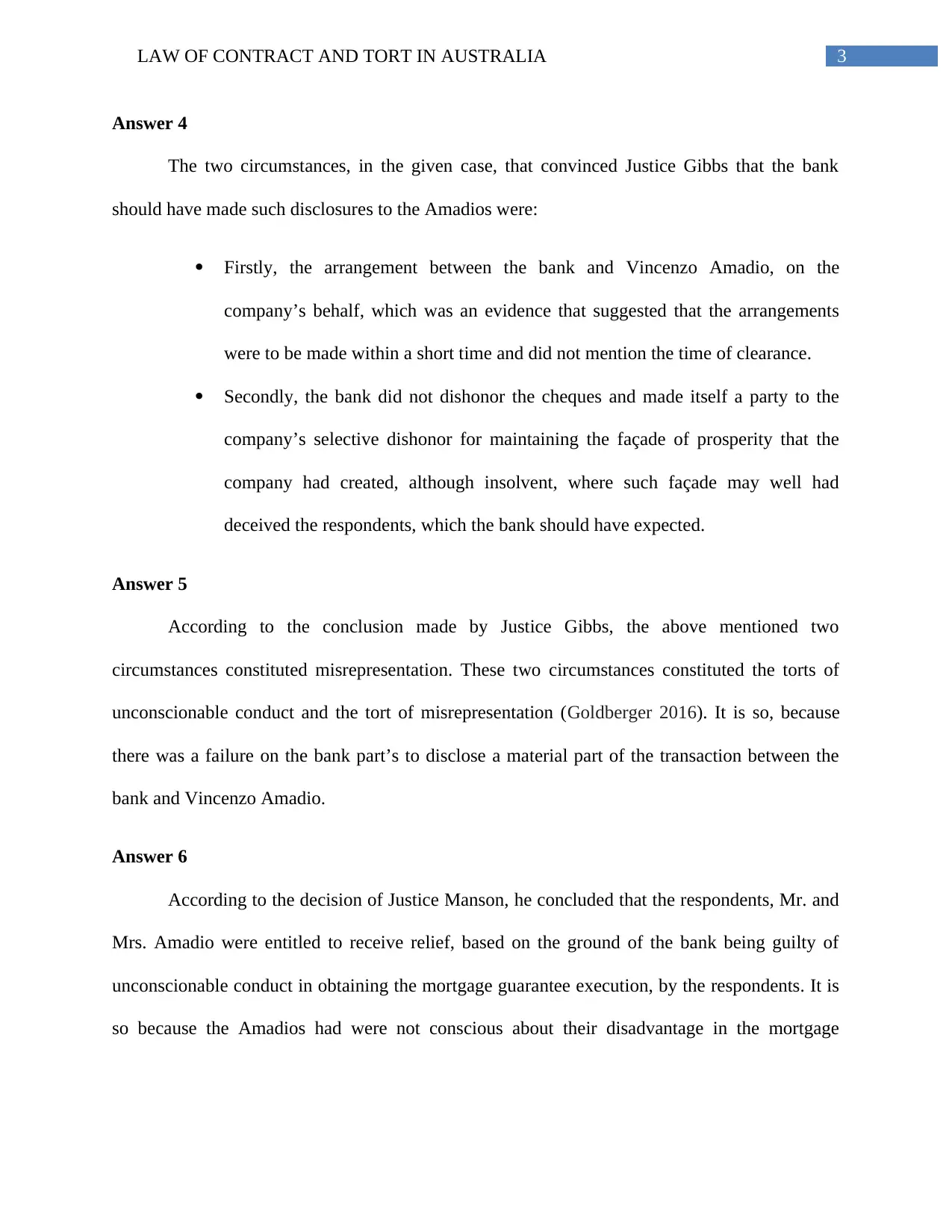
3LAW OF CONTRACT AND TORT IN AUSTRALIA
Answer 4
The two circumstances, in the given case, that convinced Justice Gibbs that the bank
should have made such disclosures to the Amadios were:
Firstly, the arrangement between the bank and Vincenzo Amadio, on the
company’s behalf, which was an evidence that suggested that the arrangements
were to be made within a short time and did not mention the time of clearance.
Secondly, the bank did not dishonor the cheques and made itself a party to the
company’s selective dishonor for maintaining the façade of prosperity that the
company had created, although insolvent, where such façade may well had
deceived the respondents, which the bank should have expected.
Answer 5
According to the conclusion made by Justice Gibbs, the above mentioned two
circumstances constituted misrepresentation. These two circumstances constituted the torts of
unconscionable conduct and the tort of misrepresentation (Goldberger 2016). It is so, because
there was a failure on the bank part’s to disclose a material part of the transaction between the
bank and Vincenzo Amadio.
Answer 6
According to the decision of Justice Manson, he concluded that the respondents, Mr. and
Mrs. Amadio were entitled to receive relief, based on the ground of the bank being guilty of
unconscionable conduct in obtaining the mortgage guarantee execution, by the respondents. It is
so because the Amadios had were not conscious about their disadvantage in the mortgage
Answer 4
The two circumstances, in the given case, that convinced Justice Gibbs that the bank
should have made such disclosures to the Amadios were:
Firstly, the arrangement between the bank and Vincenzo Amadio, on the
company’s behalf, which was an evidence that suggested that the arrangements
were to be made within a short time and did not mention the time of clearance.
Secondly, the bank did not dishonor the cheques and made itself a party to the
company’s selective dishonor for maintaining the façade of prosperity that the
company had created, although insolvent, where such façade may well had
deceived the respondents, which the bank should have expected.
Answer 5
According to the conclusion made by Justice Gibbs, the above mentioned two
circumstances constituted misrepresentation. These two circumstances constituted the torts of
unconscionable conduct and the tort of misrepresentation (Goldberger 2016). It is so, because
there was a failure on the bank part’s to disclose a material part of the transaction between the
bank and Vincenzo Amadio.
Answer 6
According to the decision of Justice Manson, he concluded that the respondents, Mr. and
Mrs. Amadio were entitled to receive relief, based on the ground of the bank being guilty of
unconscionable conduct in obtaining the mortgage guarantee execution, by the respondents. It is
so because the Amadios had were not conscious about their disadvantage in the mortgage
Paraphrase This Document
Need a fresh take? Get an instant paraphrase of this document with our AI Paraphraser
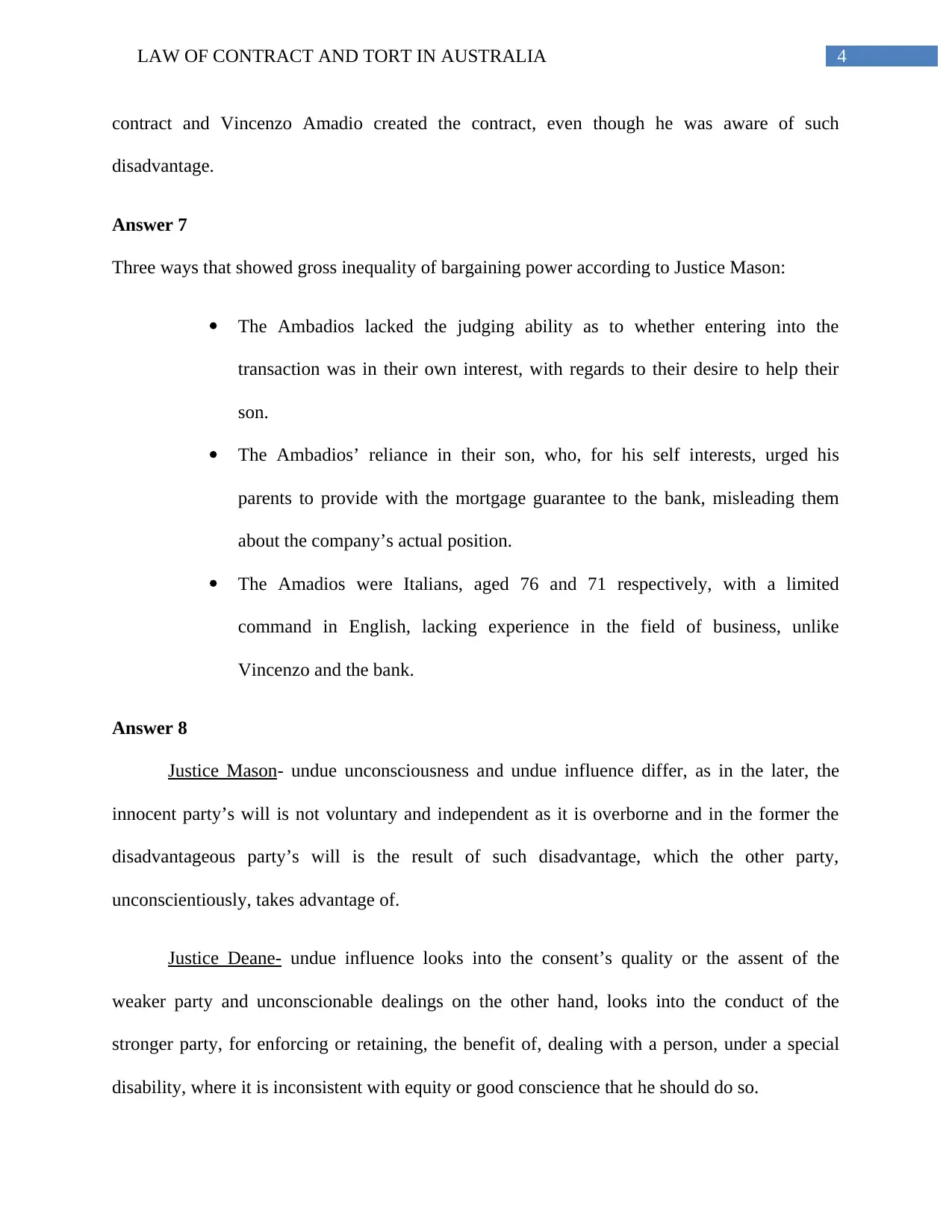
4LAW OF CONTRACT AND TORT IN AUSTRALIA
contract and Vincenzo Amadio created the contract, even though he was aware of such
disadvantage.
Answer 7
Three ways that showed gross inequality of bargaining power according to Justice Mason:
The Ambadios lacked the judging ability as to whether entering into the
transaction was in their own interest, with regards to their desire to help their
son.
The Ambadios’ reliance in their son, who, for his self interests, urged his
parents to provide with the mortgage guarantee to the bank, misleading them
about the company’s actual position.
The Amadios were Italians, aged 76 and 71 respectively, with a limited
command in English, lacking experience in the field of business, unlike
Vincenzo and the bank.
Answer 8
Justice Mason- undue unconsciousness and undue influence differ, as in the later, the
innocent party’s will is not voluntary and independent as it is overborne and in the former the
disadvantageous party’s will is the result of such disadvantage, which the other party,
unconscientiously, takes advantage of.
Justice Deane- undue influence looks into the consent’s quality or the assent of the
weaker party and unconscionable dealings on the other hand, looks into the conduct of the
stronger party, for enforcing or retaining, the benefit of, dealing with a person, under a special
disability, where it is inconsistent with equity or good conscience that he should do so.
contract and Vincenzo Amadio created the contract, even though he was aware of such
disadvantage.
Answer 7
Three ways that showed gross inequality of bargaining power according to Justice Mason:
The Ambadios lacked the judging ability as to whether entering into the
transaction was in their own interest, with regards to their desire to help their
son.
The Ambadios’ reliance in their son, who, for his self interests, urged his
parents to provide with the mortgage guarantee to the bank, misleading them
about the company’s actual position.
The Amadios were Italians, aged 76 and 71 respectively, with a limited
command in English, lacking experience in the field of business, unlike
Vincenzo and the bank.
Answer 8
Justice Mason- undue unconsciousness and undue influence differ, as in the later, the
innocent party’s will is not voluntary and independent as it is overborne and in the former the
disadvantageous party’s will is the result of such disadvantage, which the other party,
unconscientiously, takes advantage of.
Justice Deane- undue influence looks into the consent’s quality or the assent of the
weaker party and unconscionable dealings on the other hand, looks into the conduct of the
stronger party, for enforcing or retaining, the benefit of, dealing with a person, under a special
disability, where it is inconsistent with equity or good conscience that he should do so.
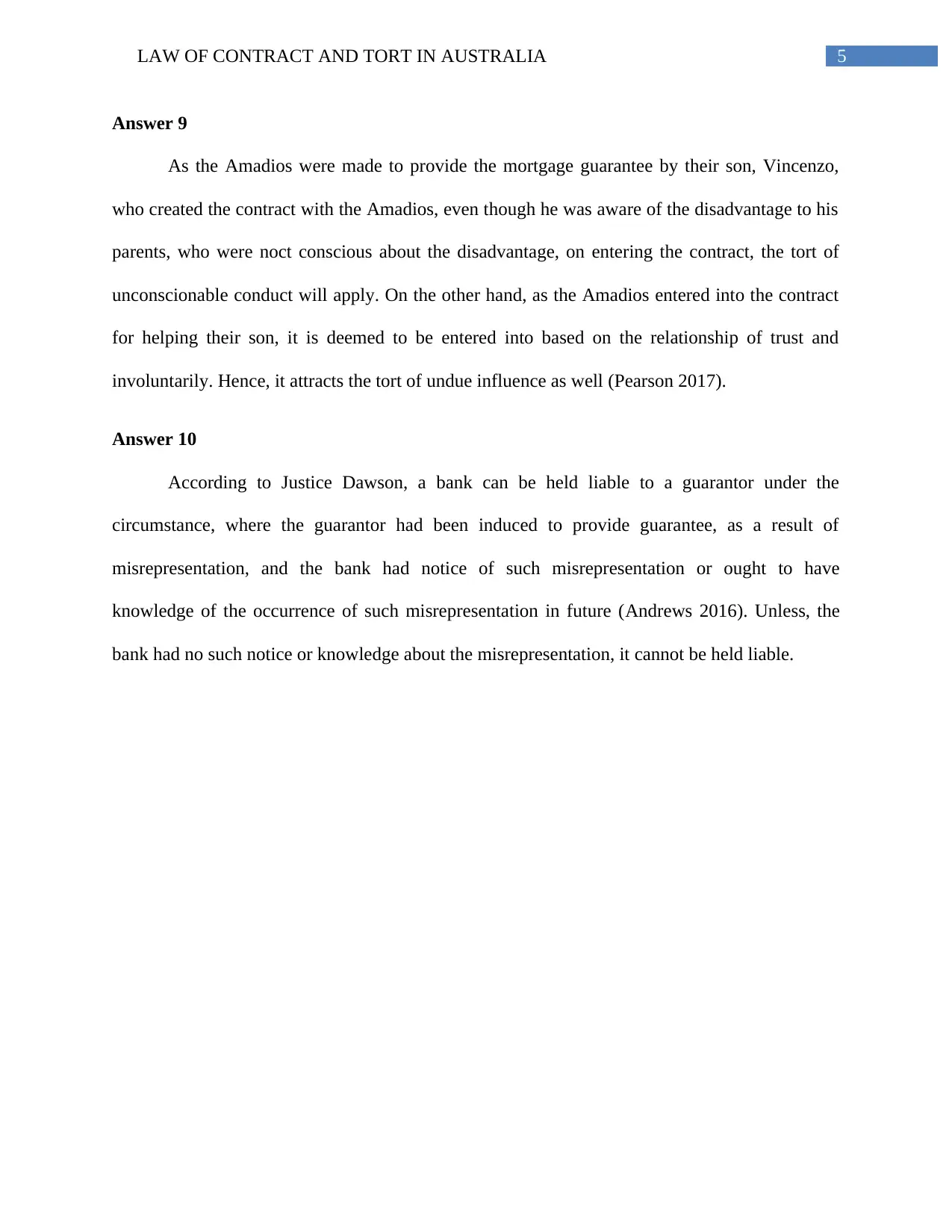
5LAW OF CONTRACT AND TORT IN AUSTRALIA
Answer 9
As the Amadios were made to provide the mortgage guarantee by their son, Vincenzo,
who created the contract with the Amadios, even though he was aware of the disadvantage to his
parents, who were noct conscious about the disadvantage, on entering the contract, the tort of
unconscionable conduct will apply. On the other hand, as the Amadios entered into the contract
for helping their son, it is deemed to be entered into based on the relationship of trust and
involuntarily. Hence, it attracts the tort of undue influence as well (Pearson 2017).
Answer 10
According to Justice Dawson, a bank can be held liable to a guarantor under the
circumstance, where the guarantor had been induced to provide guarantee, as a result of
misrepresentation, and the bank had notice of such misrepresentation or ought to have
knowledge of the occurrence of such misrepresentation in future (Andrews 2016). Unless, the
bank had no such notice or knowledge about the misrepresentation, it cannot be held liable.
Answer 9
As the Amadios were made to provide the mortgage guarantee by their son, Vincenzo,
who created the contract with the Amadios, even though he was aware of the disadvantage to his
parents, who were noct conscious about the disadvantage, on entering the contract, the tort of
unconscionable conduct will apply. On the other hand, as the Amadios entered into the contract
for helping their son, it is deemed to be entered into based on the relationship of trust and
involuntarily. Hence, it attracts the tort of undue influence as well (Pearson 2017).
Answer 10
According to Justice Dawson, a bank can be held liable to a guarantor under the
circumstance, where the guarantor had been induced to provide guarantee, as a result of
misrepresentation, and the bank had notice of such misrepresentation or ought to have
knowledge of the occurrence of such misrepresentation in future (Andrews 2016). Unless, the
bank had no such notice or knowledge about the misrepresentation, it cannot be held liable.
⊘ This is a preview!⊘
Do you want full access?
Subscribe today to unlock all pages.

Trusted by 1+ million students worldwide
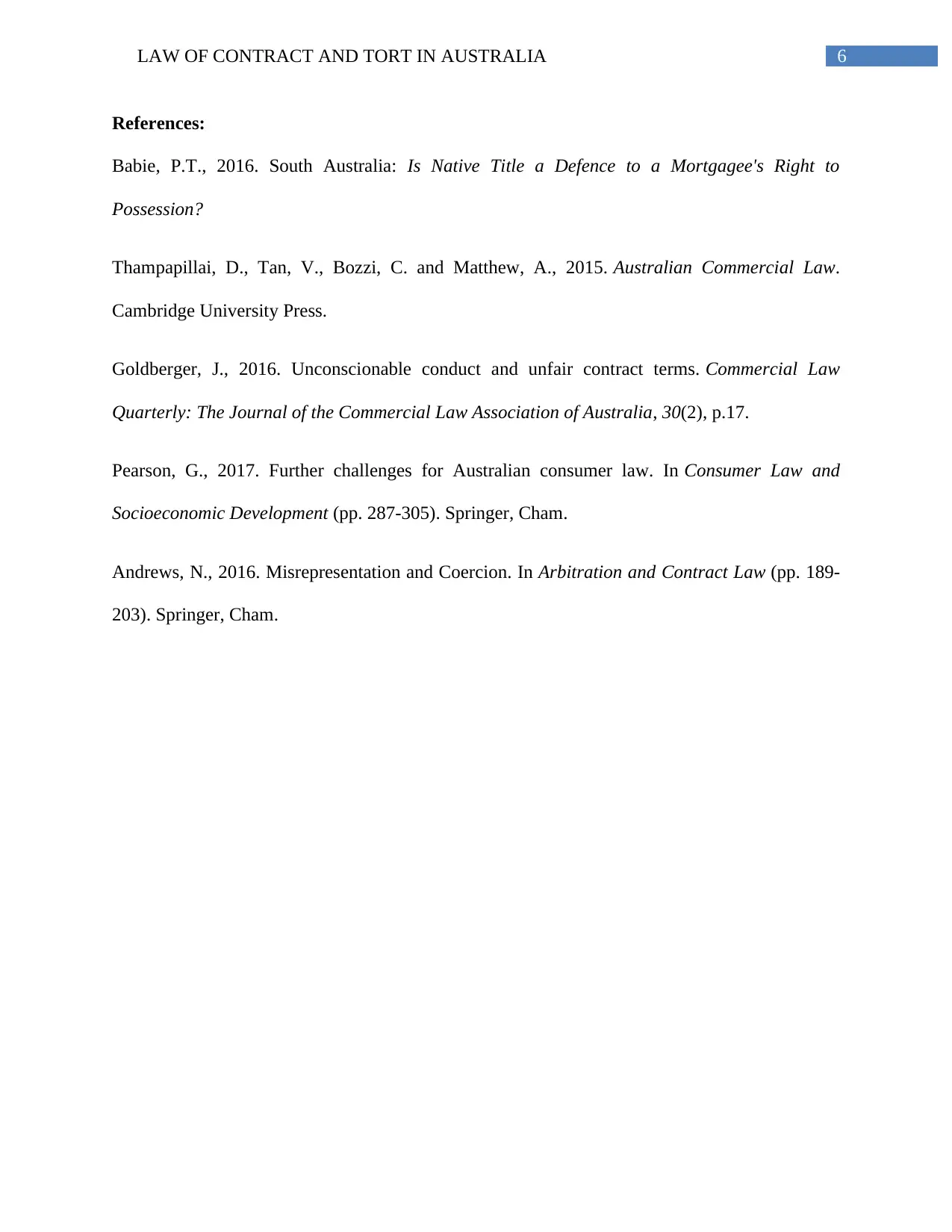
6LAW OF CONTRACT AND TORT IN AUSTRALIA
References:
Babie, P.T., 2016. South Australia: Is Native Title a Defence to a Mortgagee's Right to
Possession?
Thampapillai, D., Tan, V., Bozzi, C. and Matthew, A., 2015. Australian Commercial Law.
Cambridge University Press.
Goldberger, J., 2016. Unconscionable conduct and unfair contract terms. Commercial Law
Quarterly: The Journal of the Commercial Law Association of Australia, 30(2), p.17.
Pearson, G., 2017. Further challenges for Australian consumer law. In Consumer Law and
Socioeconomic Development (pp. 287-305). Springer, Cham.
Andrews, N., 2016. Misrepresentation and Coercion. In Arbitration and Contract Law (pp. 189-
203). Springer, Cham.
References:
Babie, P.T., 2016. South Australia: Is Native Title a Defence to a Mortgagee's Right to
Possession?
Thampapillai, D., Tan, V., Bozzi, C. and Matthew, A., 2015. Australian Commercial Law.
Cambridge University Press.
Goldberger, J., 2016. Unconscionable conduct and unfair contract terms. Commercial Law
Quarterly: The Journal of the Commercial Law Association of Australia, 30(2), p.17.
Pearson, G., 2017. Further challenges for Australian consumer law. In Consumer Law and
Socioeconomic Development (pp. 287-305). Springer, Cham.
Andrews, N., 2016. Misrepresentation and Coercion. In Arbitration and Contract Law (pp. 189-
203). Springer, Cham.
1 out of 7
Related Documents
Your All-in-One AI-Powered Toolkit for Academic Success.
+13062052269
info@desklib.com
Available 24*7 on WhatsApp / Email
![[object Object]](/_next/static/media/star-bottom.7253800d.svg)
Unlock your academic potential
Copyright © 2020–2026 A2Z Services. All Rights Reserved. Developed and managed by ZUCOL.





